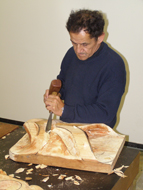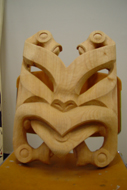Spring cometh and a carver’s fancy lightly turns to thoughts of Pack Forest! It was a pleasure for me to attend the Pack Forest hand-carving retreat last spring with Takirirangi Smith, a Maori master carver from Porirua City, New Zealand. Takirirangi (pronounced Tak-iri-rahng-i) was a visiting artist during the spring term at The Evergreen State College. A three-year partnership between Te Waka Toi/Creative New Zealand and The Longhouse Education and Cultural Center at Evergreen brings a Maori artist to campus each spring for a three-month visit, to work, teach, and present Maori culture to the community. I have a small workspace on campus, which I shared with Takiri. I suggested we go to “Stone Camp,” Takiri agreed, and the Longhouse graciously made it possible for us both to attend.

Takiri has had a diverse background – railway worker, bartender, wool handler, forest service employee, and for the past twenty-five years, Tohunga Whakairo (Master Carver) and teacher. Along the way, he also acquired a doctorate in education, focusing on indigenous knowledge. In addition to Maori carving, Takiri is versed in Maori painting, lashing, tattooing, and other art forms, and he has long experience as a musician, composer, and producer of Maori music. He currently teaches and mentors carvers at Whitireia Community Polytechnic in Porirua City, New Zealand, and undertakes carving projects around the country. While at Evergreen, Takiri was busy with a number of mask and relief carvings, what he termed a “small” canoe (16 feet long!), lectures and visits to classes on campus, and travels and talks to various Native American communities and carvers around the Northwest.
At Pack Forest, Takiri was up early each morning for a run on the trails around the reserve. Then it was breakfast and out to carve in the large open-air meeting and dining shelter. George Pratt and Ruth Mueseler provided an excellent introduction to working with Texas limestone, and not surprisingly, Takiri was a quick study. He rapidly roughed out and finished three limestone pieces playing off Maori forms and motifs. Focused he was, and soft-spoken, but his sly jokes and genial good humor engaged everyone and had us laughing.
As a Tohunga Whakairo, Takiri regularly gets called upon to design and execute the complex interior and exterior carvings for Maori meeting houses around New Zealand. He’s also known for his accomplished work as a carver of Maori canoes, and for carved ceremonial and functional works. Takiri presented a selection of this work one evening at Pack Forest, impressing us with the range and scale of his projects, not to mention the skill and elegance of his carvings.
Right after the Pack Forest retreat, Takiri packed up and headed back to New Zealand. Being a carver, he had a truckload of stuff to take home - my students and I built and packed a big, almost truck-sized, crate to follow him, with all his wood, wood tools, books, a set of stone carving tools and even a few rocks. By his own report, he had a great time at Pack Forest, and would love to come back for more NWSSA retreats. He might be the only card-carrying NWSSA member in New Zealand – if we had cards – so look him up if you head that way!
Takiri’s visit to Pack Forest was enriching and fun for him and for members. I hope other Pacific Rim indigenous carvers brought to the Northwest by organizations like the Longhouse can take part in NWSSA retreats in the future. NWSSA has currently made scholarship funds available to cover part of the costs for a Native carver to attend Camp Brotherhood. If you know of a Native carver who could grow and share with us at Camp B contact Arliss Newcomb, camp director: 360-385-7150, This email address is being protected from spambots. You need JavaScript enabled to view it.
To talk with Takiri in New Zealand, his email address is This email address is being protected from spambots. You need JavaScript enabled to view it.

